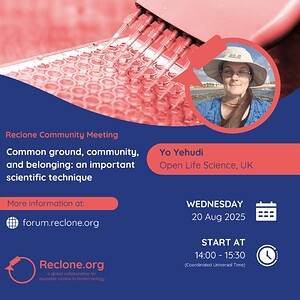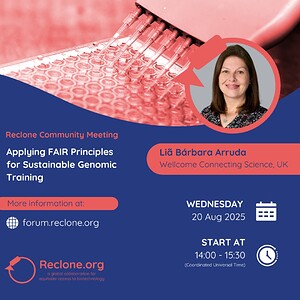Hello Reclone Community ![]()
You’re all invited to our Community Meeting later this month, on 2025-08-20T14:00:00Z. This will be another slightly longer session (up to 1.5h) as we have two talks scheduled!
![]() Join us via Zoom: Launch Meeting - Zoom
Join us via Zoom: Launch Meeting - Zoom
For our first talk, we will hear from Yo Yehudi (Open Life Science, UK), presenting about Common ground, community, and belonging: an important scientific technique:
“The scientific method” is often portrayed on a pedestal of pseudo-objectivity, with researchers being expected to perform as emotion-free vessels creating scientific knowledge. The reality is quite different, with science being created by very real, complex, and often troubled humans [1] who may not have effective means of support. (Author’s note: I’m undeniably one of those flawed and often troubled humans!)
This talk introduces core interpersonal psychosocial concepts including “psychological safety”, “trustworthiness”, and “emotional intelligence”. These aspects affect science directly, by affecting the researchers who create the science and the ways they interact to collaborate or compete. Counter-intuitively to the “objective” ideal, teams with real psychological safety, trust, and wellbeing tend to perform more effectively and have fewer errors compared to teams that do not focus on interpersonal needs.
Finally, we introduce the OLS Open Seeds and Nebula training programmes (https://we-are-ols.org/), which use an open science framework to build research teams that are consciously designed to encourage psychological safety, researcher wellbeing, and scientific robustness.
[1] Mental Health in Academia: Shedding light on those who provide support | eLife
For our second talk, we will hear from Liã Bárbara Arruda (Wellcome Connecting Science, UK) and learn more about Applying FAIR Principles for Sustainable Genomic Training
Strengthening genomic capacity requires more than delivering courses. One of the pillars for sustainable development is to equip trainee scientists to disseminate their new skills and expertise within their local communities. Wellcome Connecting Science Train the Trainer initiatives focus on active learning and evidence-based methodologies to prepare scientists to design, deliver, and sustain high-quality training. In this talk, we will discuss how applying FAIR principles (Findable, Accessible, Interoperable, and Reusable) when developing and distributing training resources can empower new trainers to adopt and propagate these practices in their own context.
Feel free to invite and share news to others in your networks who might be interested ![]()
You can also check our previous meetings at Events – Reagent Collaboration Network or via the Reclone YouTube channel.
Likewise, you can see the Upcoming Events on the Reclone Calendar, tell us you’re Interested/Going, and add these to your own calendar.
See you all at the meeting!

